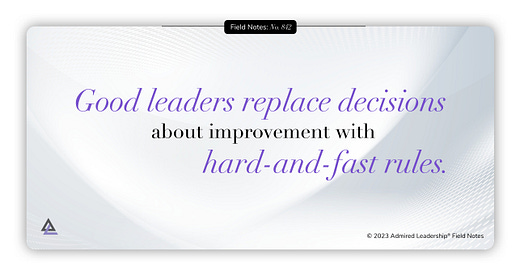Some things can always be better.
Good leaders never lose their focus on continually improving the ingredients that make teams and team members better. The team culture, team member skills, meeting effectiveness, and workstream processes are just some of the areas that should always be getting better.
The same is true for making themselves better. Leaders continually strive to be better organized, give more powerful presentations, and to craft more effective strategies, among many other areas for improvement.
Leaders invest in improvement by implementing new practices and trying new things. They make decisions to incorporate better activities and processes to make progress. However, over time, these decisions become highly repetitive and the energy and creativity to make them are hard to maintain.
That’s why good leaders replace decisions about improvement with hard-and-fast rules.
Think about how this works in an area of self-improvement, like getting in better shape. For most people, this means exercising more frequently. Exercising requires a decision every day as to if, when, and where the activity is to take place.
Consistently making this choice becomes harder each day, especially as other work and goals compete with the time required. In too many cases, people make the decision to exercise for several days and then lose the steam required to maintain the effort.
Days or weeks later, they start all over again, making the daily decision to exercise or not. For some people, this on-again, off-again pattern repeats itself in perpetuity. Why do they fail at maintaining consistent and steady progress? Because they are making a decision every day rather than committing to a hard-and-fast rule.
When those who want to get in shape through exercise set a firm rule and follow it (ex. “I will work out every day for 45 minutes at 6 am.”), they are no longer in the decision business. They are in the commitment business.
Rules that replace decisions surrounding improvements are commitments to do the same thing every time. Rather than deciding at every turn, the rule decides for you.
The list of possible rules is limitless and constrained only by creativity:
Starting every meeting with a teaching moment
Ending all conversations with a thank-you
Exploring common situations and problems in a clinic format at every team meeting
Never reaching a team decision without asking a particular question
No email requests on weekends
Discussing major disagreements face-to-face
No dessert on days without a workout.
Ask yourself: What rule will galvanize the commitment to make continual progress? Whenever improvements are ongoing, personally or professionally, rules will help maintain a deeper commitment to improvement.
What everyday decision about improvement should you replace with a rule?





gained more knowledge how to meet daily team before work active engagée.